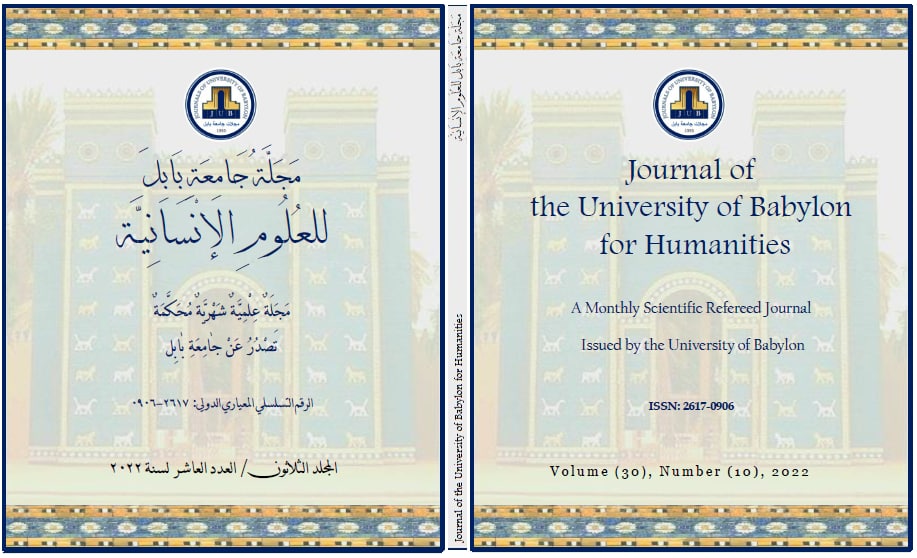Abstract
The problem of the research was determined that the researcher noticed many learners of Arabic as a second language in the program of competence in Arabic for non-native speakers of Language and Culture at the Institute of Arabic Linguistics Department at King Saud University, facing challenges in learning Arabic phonemes. The research aimed to identify the challenges of the three components: (phonetic, skill, social) to learn Arabic sounds as a second language, and to achieve this, the research followed the descriptive analytical approach to the subject literature. One of its results was; The challenges of the phonemic component are: (The variation in exits and attributes, or the difference in their features, or their proximity; affects their distinction, perception, or alteration, and that the challenges are not of a single style, governed by individual differences between learners (nationality, gender, language, age). psychological, social, motivation, goals...), the educational environment (internal): (teacher, books, equipment, activities, place...) and external: (community language, open society...), and the challenges of the skill component, They are: (that it constitutes the reception or pronunciation of sounds of vocabulary and structures that are similar, dissimilar, or merging; it may affect the intention of the linguistic message), and the challenges of the social component are: (Language use in the general social environment affects phonemes in pronunciation, perception, or accent). In light of the results of the research, the researcher recommended the need to develop special programs to deal with the challenges of learning the phonemes of the Arabic language as a second language, and to pay attention to the phonemic aspect and its strategies at all levels.
Keywords
: Challenges
Arabic Language
phonemes
phonetic component
second language
skill component
social component.
Abstract
تحددت مشكلة البحث في أن الباحث لاحظ كثيرا من متعلمي اللغة العربية لغة ثانية في برنامج الكفاية في اللغة العربية لغير الناطقين بها بقسم اللغة والثقافة في معهد اللغويات العربية بجامعة الملك سعود؛ يواجهون تحديات في تعلّم فونيمات العربية. وقد هدف البحث إلى التعرف على تحديات المكونات الثلاثة: (الصوتي، المهاري، الاجتماعي) لتعلم الأصوات العربية لغة ثانية, ولتحقيق ذلك اتبع الباحث المنهج الوصفي لأدبيات الموضوع. وكان من نتائجه؛ أن تحديات المكون الصوتي، هي: (أن التباين في المخارج والصفات، أو الاختلاف في ملامحها، أو تجاورها؛ يؤثر في تمييزها أو إدراكها، أو تبديلها، وأن التحديات ليست على نمط واحد فتحكمها الفروق الفردية بين المتعلمين (الجنسية، الجنس، اللغة، العمر، النفسية، الاجتماعية، الدافعية، الأهداف...)، والبيئة التعليمية (الداخلية): (معلم، كتب، أجهزة، أنشطة، مكان...) والخارجية: (لغة المجتمع، مجتمع مفتوح...)، وتحديات المكون المهاري، هي: (أنه يشكل استقبالًا أو نطقًا لأصوات المفردات والتراكيب متشابهًا أو متباينًا أو مندمجًا؛ قد يؤثر في مقصود الرسالة اللغوية)، وتحديات المكون الاجتماعي، هي: (أن الاستعمال اللغوي في الوسط الاجتماعي العام يؤثر في الفونيمات نطقًا أو إدراكًا أو لُكْنةً). وفي ضوء نتائج البحث أوصى الباحث بضرورة وضع برامج خاصة للتعامل مع تحديات تعلم فونيمات اللغة العربية لغة ثانية، والاهتمام بالجانب الصوتي وإستراتيجياته في جميع المستويات.
Keywords
تحديات، فونيمات، اللغة العربية، لغة ثانية، المكون الصوتي، المكون المهاري، المكون الاجتماعي.
